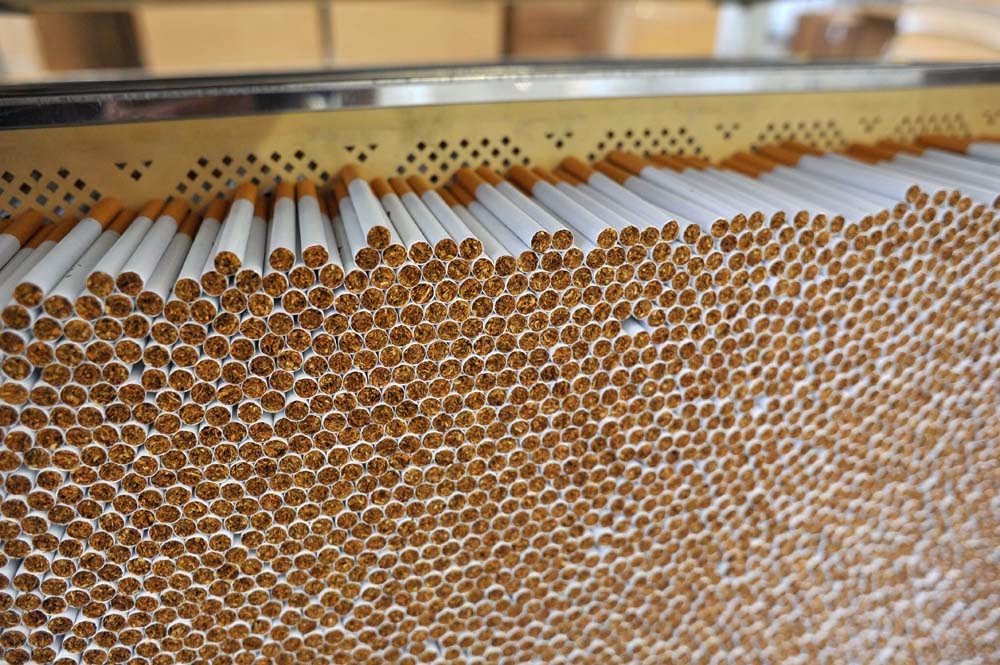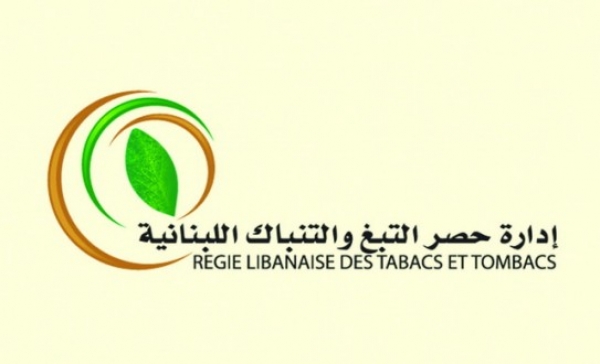
Cheap filter cigarettes produced by Regie are in demand as various people, from Syrian refugees to low-income people, are chain-smoking them, braving the odds.
Business is brisk at the Regie Libanaise des Tabacs et Tombacs, Lebanon’s government-owned tobacco company.
Production of the Regie’s Cedars cigarettes is up 50 percent, from roughly 65,000 master cases- or 500 packs of cigarettes- produced per month in 2019, to over 100,000 produced in November 2021.
“It’s something we’re very proud of, of course,” Hussein Nasrallah, Head Officer of Transport and Insurance, says while leaning back in his chair at the Regie office in the Beirut suburb of Hadath.
“It’s also something we’ve worked hard to accomplish.”

Ironically, it seems the boom comes not in spite of the country’s economic crisis that has ravaged both public and private sectors alike, but, in part, because of the crisis.
The Regie is a monopoly, meaning it is responsible for all tobacco in the country, from imports and exports to growing and selling. It produces for and profits off the sale of international brands in the country, and also produces and sells its own brand: Cedars, emblematic of the country’s national tree.
Until 2019, when Lebanon’s economic and political crisis began, Cedars was known to be a cigarette bought mostly by the working class. Selling, at that time, for 750 LL a pack, or what was the equivalent of USD 50 cents, it was by far the most affordable cigarette on the market. In 2005, when the Syrian Army withdrew from Lebanon, sales of Cedars dropped 50 percent.
When the Syrian War began in 2011 and refugees began fleeing to Lebanon by the thousands, the trend flipped again, with the Regie’s then-head of import and export Pierre Hedari saying the uptick in sales was “mainly due to the Syrian refugees.”
Fast-forward to 2021, where, according to UN estimates, upwards of 82 percent of the Lebanese population is living in poverty, and the Regie is once again seeing a huge spike in sales. Nasrallah estimates that “60 to 70 percent” of smokers have converted to Cedars since 2019, which sell at half the price of international products from brands like Phillip Morris or British American Tobacco.
Due to lower demand in the market, international brands have largely pulled all but one or two of their products from the shelves in Lebanon, which, as a monopoly, the Regie also feels the impact of.
But, the company said, with profits from Cedars slated to hit a years-long high, the loss of profit from international brands won’t really affect their bottom line.
There’s also the fact that the price of Cedars is attractive to smugglers looking to make a profit in neighbouring countries, likely leading to higher sales, though it would be impossible to know for sure.
And the reverse is also true, according to Nasrallah.
“The devaluation of the Lebanese Lira stopped illegal cigarettes from coming into the country,” he says, reasoning that Cedars- not smugglers- has the lowest price point on the market, and acknowledging that smuggling is something the Regie has worked long and hard to combat.
In fact, many Regie employees attribute continued success- particularly over the last three years- to a commitment to ethics and sustainability.
Nasrallah says that the 14,000 farmers that the Regie contracts with have had their wages adjusted to “three to four times the original amount” during the economic crisis aimed at enhancing the quality of living for the community, a key element of the company’s sustainable development plan, which aims to promote human and environmental rights; enhance consumer protection; and engage and develop communities.
A needle in a haystack
Regie’s success comes in comparison to the vast majority of failing public institutions in Lebanon.
Since 2019, the country’s central bank, Banque du Liban, has halved its foreign currency reserves, leading to a lifting of subsidies on critical supplies like medicine, fuel, and diesel.
Électricité du Liban, the primary source of electricity in the country, has, for three decades, failed to provide regular electricity to Lebanese households. Its losses amount to over 1.6 billion dollars each year.
The examples- to the Traffic and Vehicles Management Authority to ministers themselves- go on, carrying on a legacy of a Lebanon reeking of corruption and inefficiency.
The history of corruption predates Lebanon’s ongoing economic crisis, which continues to see the local currency plunder to an over 90 percent decline and force huge segments of the population into crippling poverty. Instead, corruption began flourishing in the aftermath of Lebanon’s 1975-1990 civil war, which saw warlord businessmen given impunity for their crimes, allowing them free reign to exploit the newly-created confessional system in Lebanon, which calls for power to be shared among religious sects.
While praised at the time, many are now heavily critical of the system which they say has allowed power to remain in the hands of a few wealthy families, who have only gotten richer over the years.
The system has also proven infamously resilient to change, making matters worse. When people took to the streets in October of 2019 after the announcement of the proposed WhatsApp tax- the last straw, so to speak, after 30 years of governmental ineptitude- protesters demanded an institutional change. ‘Kilon yani kilon’ (everybody means everybody) was the revolutionary slogan, taken to mean that every warlord and party needed out of politics.
Since that time, change has only come in the form of recycled prime ministers; a decimation of Beirut in the form of the Beirut Port explosion on August 4th, 2020; and a continued collapse of the currency.
And, to be clear, the Regie does not pretend corruption doesn’t exist, with Nasrallah saying it’s a hurdle that has only become more difficult and frustrating to navigate since 2019.
But, particularly in a market as volatile as Lebanon’s, he says, there is little he or his colleagues can do.
Instead, an employee says, the best the Regie can do is set a new precedent through example.
“Public employees are part of a public service. We are here to perform a public service,” says the employee.
“It’s a responsibility we take seriously, and that is a great example to be followed.”
TRT World

Leave a Reply
You must be logged in to post a comment.